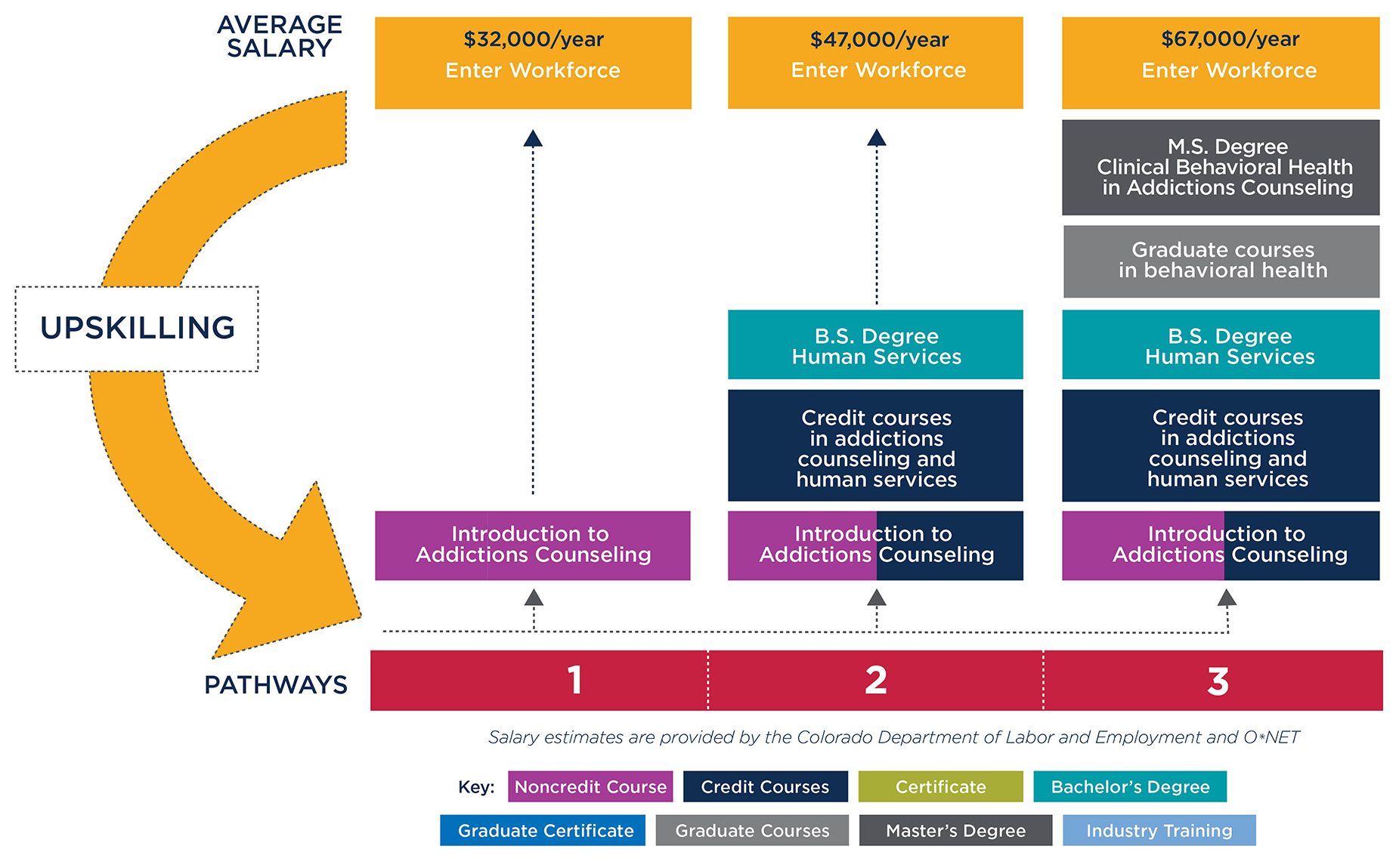Start your journey toward becoming an addiction or substance abuse counselor
Introduction to Addictions Counseling explores the core functions of assessing and treating substance abuse disorders and provides an overview of the tactics, knowledge, and attitudes needed to be an effective substance abuse counselor. The addiction counseling course teaches students therapeutic communication skills such as active listening, empathy, reflection, and affirmation, which are essential for building trust and creating positive client outcomes.
Students will delve into the complexities of substance use disorders, examining their etiology, assessment, and treatment through a multidisciplinary lens. The course also addresses the impact of culturally diverse populations on the counseling process and treatment outcomes, equipping students to navigate the unique challenges presented by various client demographics. Ethical and legal considerations, trauma-informed care, and clinician self-care are also integral components of the curriculum, giving students a well-rounded understanding of the field.
This addiction counseling course serves as an ideal starting point for students who are eager to pursue further education and go onto careers in addiction or substance abuse counseling and can stack into an MSU Denver credential or degree, providing a pathway for students to deepen their expertise and advance their professional journey.
Why take this addiction counseling course?
Flexible schedule
The course can be completed in 4-8 weeks and is self-paced online.
Career advisement
Receive a personal advising session with an industry leader.
A Career That Changes Lives
With substance abuse on the rise, the demand for skilled addiction counselors is growing, offering meaningful opportunities to make a lasting impact.
Career pathways for addictions and substance abuse counseling
Approximate return on investment for students in each addiction education pathway

After taking the addiction counseling course and developing your knowledge of addiction-informed care, you can immediately enter the workforce or continue onto a degree through MSU Denver and increase your earning potential.
Pathway 1: Complete the Introduction to Addictions Counseling course and immediately enter the workforce in support roles.
- The median salary is $32,000 a year.
Pathway 2: Continue your counseling education by earning a bachelor’s degree in Human Services at MSU Denver. The Introduction to Addictions Counseling course can count toward the required counseling courses.
- The median salary is $47,000 a year.
Pathway 3: Enhance your earning power with MSU Denver’s Master of Science in Clinical Behavioral Health. The Introduction to Addiction Counseling course can count toward the degree’s required counseling courses.
- The median salary is $67,000 a year.
About Introduction to Addictions Counseling
The Introduction to Addictions Counseling course will review the required knowledge, skills, and attitudes to be an effective addiction counselor.
In addition, students will research and examine the etiology, assessment, and treatment of substance use disorders. Students also examine ethical and multicultural issues, trauma-informed care, and clinician self-care. By connecting theory with practical applications, the course helps students build the confidence and expertise needed to make a meaningful impact in the field of addiction counseling.
In addition, this addiction counseling course also teaches the practicals of active listening, showing empathy, reflections, and affirmations — which are all important aspects of addiction counseling. By the end of the course, students will have foundational skills and insights to support individuals on their journey to recovery.
The course is $450, with a $35 transaction fee per payment. There are no books to purchase.
- Registration opens in December
- Course begins – February 3, 2025
- Last day to register – February 10, 2025
- Course ends – April 4, 2025
- Registration opens in April
- Course begins – September 2, 2025
- Last day to register – September 9, 2025
- Course ends – November 2, 2025
Once you successfully complete the Intro to Addictions Counseling online course, you can immediately enter the workforce with newly learned skills. You will receive a digital badge embedded with the competencies learned. You can include this badge on your resume, LinkedIn page, portfolio, or share it with an employer. Students will also receive a certificate of completion.
Students can also convert the course to three credits and continue to an MSU Denver certificate or degree.
See FAQs for more information.
- Identify ethical and legal challenges in the counseling profession.
- Analyze the implications of culturally diverse populations on the counseling process and treatment outcomes.
- Demonstrate therapeutic communication skills such as active listening, empathy, reflection, affirmation, and summaries.
- Critique and research models regarding the etiology, assessment, and treatment of substance use and mental health disorders.
- Evaluate tools and instruments for the assessment of substance use and mental health disorders to be used by addiction counselors and substance abuse counselors.
- Describe the key elements of Trauma Informed Care and how it is used to address trauma in individuals, agencies, and communities.
- Discuss the importance of counselor self-care and how to transfer that into a personalized self-care plan.
About your addiction counseling course instructor
Addictions Counseling instructor
Patrick Griswold brings over two decades of diverse experience in the behavioral health field as a clinician, administrator, and educator. He is a licensed mental health and addiction counselor as well as a registered nurse (RN) with a specialization in mental health nursing. This unique combination of expertise enables him to integrate medical and therapeutic perspectives, providing a holistic approach to addiction counseling.
Patrick previously served as the director of North Charles, a Harvard Medical School-affiliated substance abuse treatment program in Cambridge, MA. In this role, he not only managed clinical operations but also spearheaded innovative treatment programs aimed at improving outcomes for individuals struggling with addiction. His commitment to education was evident as he provided training and supervision to Harvard Medical School residents, helping shape future leaders in behavioral health.
Currently, Patrick serves as a faculty member at Metropolitan State University of Denver, contributing his knowledge to both the Human Services and Counseling, and Nursing Departments. His courses emphasize evidence-based practices, ethical considerations, and culturally responsive care, ensuring that students are well-prepared to address the complexities of addiction counseling.
Patrick’s teaching style combines real-world experience with academic rigor, making him a highly respected and relatable instructor. He has a unique ability to bridge the gap between theory and practice, helping students see the practical applications of their learning in real-world settings. His approachable demeanor and commitment to student success create an engaging and supportive learning environment. Patrick’s dedication to education, coupled with his extensive professional experience, makes him an invaluable resource for students pursuing meaningful careers in this critical field.

Register
Fall registration opening soonRequest more information
Request more informationCareer Launchpad Frequently asked questions
Frequently asked questionsContact us
Email usPhone: 303-615-1234
Office Location:
Jordan Student Success Building
3rd Floor – #330
Auraria Campus
Mailing Address:
Metropolitan State University of Denver
Innovative and Lifelong Learning
P.O. Box 173362
Campus Box 6
Denver, CO 80217-3362

